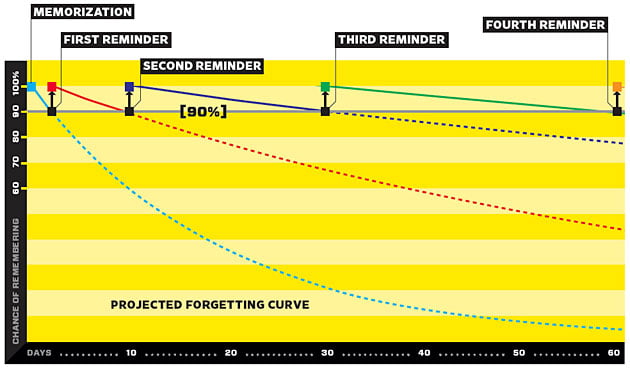Before we tackle that problem, we need to answer this question first: why do we need to learn vocabulary at the first place, especially when we are able to communicate in most of the time?
Nội dung
Misconception 1: adequate comprehension = enough vocabulary
20% of all vocabulary makes up 80% of conversation, this is the Pareto principle you may have heard of. So yes, if you are beginning to learn a language, then learning the important 20% of vocabulary first is a smart start. Furthermore, if you don’t have trouble in reading this, then it is safe to say that you have acquired 4000 – 5000 word families, and can understand at least 95% of English conversation. 95% of all conversations, that’s an impressive number! For a non-native English speaker, it’s a long road to fluency and you must have traveled a long way to be where you are now. “A thousand mile journey begins with a single step”, said Laozi, and you have completed 950 miles.
The bad news is, 95% is only considered enough for adequate comprehension. To enjoy reading a book, you need at least 98% coverage. Gaining more 3% when you are already at 95% seems like a piece of cake, but actually starting from the fifth 1000 word families, acquiring just another 1% of coverage is hard. With a vocabulary of 4000 word families, then for every one-minute speaking scene in the movie Shrek you will encounter 5 unknown words (or 1 unknown word for every two sentences). Just imagine how large your vocabulary is required in order to understand a movie for kids.
You are now trapped in between a rock and hard place. You want to learn more vocabulary, but they are all infrequent words so you hardly have a chance to practice them.
Why are there so many infrequent words? Because life is so diverse, and for every situation you need to use specific vocabulary. Without having the right words, it is impossible to construct a clear, interesting, or emotional message. Or to quote Mark Twain:
The difference between the almost right word and the right word is really a large matter. It’s the difference between the lightning bug and the lightning.

Note that he also said: “Thunder is good, thunder is impressive. But it is lightning that does all the work”.
Misconception 2: new vocabulary can be acquired by guessing the context
When you read a text and meet an unknown word, what would you likely do? You skip it. Looking at it is no difference to looking at a blank space. But as presented above, that particular unknown word is probably important to understand the whole idea. It is the right word that the author had been seeking high and low, and without it that lightning text you are about to read is just a lightning bug.
Let’s take a quick experiment to illustrate this. In the paragraph below the three least frequent words has been taken out. How much of it can you now understand? Can you guess what words are missing?
There is increasing evidence that the impacts of meteorites have had important effects on Earth, particularly in the field of biological evolution. Such impacts continue to pose a natural hazard to life on Earth. Twice in the twentieth century, large meteorite objects are known to have collided with Earth.
(TOEFL iBT sample test)
Without knowing the words, you can still guess what the text is about: something about an important event with large objects that happened on the Earth, and it directly affected life and evolution. But despite how hard you try, a lightning bug is not a lightning, and your adequate understanding is not enough to visualize this picture in your head:

There are two points to consider here:
- Without knowing the words first, you cannot understand the context. You see, only 3 words (or 8%) in a total of 38 unique words are missing, but without them, your understanding of the text is just… adequate. You cannot be enlightened, and the text is just a lightning bug. This is what we have discussed in the previous section.
- But on the other hand, only after having understood the context that you can be ready to understand the unknown words. You may have met the words before, but your brain just skips them, because that exposure is meaningless. An exposure to a new word can only be counted as meaningful if it links to something that you have already known. Researchers call this phenomenon as contextual prerequisites for understanding.
Let’s take another experiment. Please return to the sample text, and click on the gaps to reveal the hidden words. What do you feel? Do you feel the words should be obvious, after knowing the topic of the text? This feeling illustrates your readiness to meet it. (Of course this experiment is somewhat skewed, because probably you may already know them. But the point stands.) When people say “learn from context”, they aren’t aware that sometimes you have no clue what the context is about.
So, to sum up, either from the context or in the vocabulary itself, one must be understood first in order to understand the other. This is the circular problem that every learner has to face.
You can break this loop by knowing the words in advance. Usually this is done by looking it up in the dictionary straight away. Now thanks to the digital age, this is quicker and simpler than ever before. However, keep in mind that (1) your reading flow is interrupted to look up the words, therefore adding cognitive workload, and (2) sometimes the words are defined by another unknown words*, hence creating another circular loop.
*For example, the Merriam – Webster dictionary defines the word Ostentatious: “marked by or fond of conspicuous or vainglorious and sometimes pretentious display”.
For (1), from just reading the text again, you can resume your reading flow, but it is not as efficient as not having interruption as first. If you are going to read a lot of advanced, complicate articles, then it is better to learn the words ahead of time. Your time and your cognitive load is priceless, so it is recommended to optimize your vocabulary learning. For (2), many English dictionaries nowadays have dictionaries for learners. Their vocabulary definitions are restricted to between a range of 2000 and 3000 of the most frequently used word families (vocabulary range of a six-year-old child). Depending on the word, it may not be possible to define it accurately and precisely, but at least it is acceptable for learners.
But wait, we are not done yet. There are actually three points I want you to be aware of. I didn’t mention the last point earlier because it is worth having a separate section for this: (3) your newly acquired memory will fade away in time, if it’s not reinforced.
On the verge of forgetting
Oh, I’m sure that I’ve learned this stuff before, but I just can’t remember it now! Now I will have to look it up again. What a waste of time! — Isn’t that familiar? In that moment, you just wish that your brain would be able to memorize forever everything that you’ve learned.
But it would be a catastrophe if our only source of memory was Google. The true advantage of biological over computer memory is not about remembering everything. It’s about forgetting. Forgetting what isn’t relevant allows us to remember what’s important. The more exposure you have to something, the more we can recall when needed. You need to refresh it frequently to imprint the word into your memory.
However, by definition, an infrequent word isn’t the word that you need daily, weekly or even monthly. For example, only 57% of the 3rd 1000 word families from novels of Jack London repeat 6 times. This is not enough to enable it to be learned from exposure. As a result, active reviewing is necessary to not forget. But how should we review? Reviewing too soon when we haven’t forgotten much gives us the illusion of knowing it well, because the brain only looks for new things and skips the old. Reviewing too late when we have already forgotten it wastes your effort to memorize it. The optimum strategy is to review when you are about to forget. And this is a conundrum: how to identify when we are on the verge of forgetting?
The bright side of forgetting is that it seems to follow a mathematical function. This is fascinating, because now you can approximately predict when you are on the verge of forgetting and need to review again. Basically, that function reveals to us that after memorizing, the retention ability will drop fast after a short period of time. However, for each review, the new curve is less steep than before. After several reminders, you can remember the word for a couple of years. Any use of it in this stage will be a natural reminder for you. You now have some memories linked to that word. It’s not a strange word anymore, it’s your own word. It’s a part of you.

Notice that this is a projected graph, because the result of the function largely depends on the initial conditions: the information and the person learning it. A high impact event to that person is not likely to be forgotten for a long time. That’s why it is important to spend effort to really understand the information and to understand that person.
So if someone doesn’t remember what you have already told them, then be patient. It’s not really their fault. They just don’t have full control over how their own memory works, even when they put in an effort to remember it. They don’t even foresee how quick their forgetting rate is. If the message is important, then make sure it is presented in a clear, interesting, and emotional way. Getting to the root of the problem and making it worth knowing is an arduous task. It takes time, but it’s worth it. Because someone who is willing to do an arduous task for another person is someone who really cares.
- Nation, I. S. P. (2006). How large a vocabulary is needed for reading and listening? The Canadian Modern Language Review
- ETS, TOEFL iBT® Test Questions
- Bransford, J.D., & Johnson, M.K. (1972). Contextual prerequisites for understanding: Some investigations of comprehension and recall. Journal of Verbal Learning and Verbal Behavior
- Shirley J. Adams (1982), Scripts and the Recognition of Unfamiliar Vocabulary: Enhancing Second Language Reading Skills, The Modern Language Journal
- Gary Wolf (2008), Want to Remember Everything You’ll Ever Learn? Surrender to This Algorithm, Wired
- Woźniak Piotr A., Gorzelańczyk Edward J. and Murakowski Janusz A. (1995) Two components of long-term memory, Acta Neurobiol Experimentalis
Giúp nhau thoát nợ
Khi một người cần vay nhiều thì sẽ có 2 nguồn để vay:
- Từ bạn bè, người thân
- Từ các dịch vụ cho vay tín chấp, bất kể đó là vì lợi nhuận hay phi lợi nhuận
Nhưng:
- Vay từ bạn bè, người thân thì khó mở lời, mà nếu đã mở lời thì cũng có vô số lý do để họ từ chối. Có những người dù có tiền và cũng quan tâm bạn bè nhưng vẫn quan niệm rằng "Không cho vay thì mất bạn. Cho vay rồi còn mất nhanh hơn"
- Vay dịch vụ thì có thể không đủ điều kiện để được vay, hoặc lãi quá cao, hoặc hạn mức không đủ để xử lý vấn đề
Ai cũng biết giải pháp cho chuyện này là góp gió thành bão, nhiều người cùng tham gia hỗ trợ họ. Một trong những cách thường gặp là gây quỹ cộng đồng, như mở tài khoản trên Thiennguyen.app hay GoFundMe rồi vận động mọi người tham gia, chia sẻ. Nhưng giải pháp này có những vấn đề, ở cả phía cá nhân người cho tiền cũng như ở mô hình. Với người cho tiền, dù sự giúp đỡ người khác làm con người cảm thấy cuộc sống có ý nghĩa, việc mất tiền vẫn làm cho tâm lý của họ bị đau. Với mô hình, nó không chú trọng vào việc xây dựng cộng đồng hay thay đổi hệ thống, mà chỉ dừng ở mức từ thiện.
Song song với việc xây dựng các hình thức kinh tế thay thế phi tư bản, một giải pháp cho tình trạng này là thành lập một quỹ vi mô với mục đích giúp đỡ nhau hơn là kiếm tiền, nhưng vẫn đem lại lợi ích hợp lý cho người cho vay. Nếu bạn đã từng cho bạn bè mình mượn tiền và muốn chuyện này được giải quyết triệt để hơn, bạn có thể cân nhắc tham gia quỹ.
